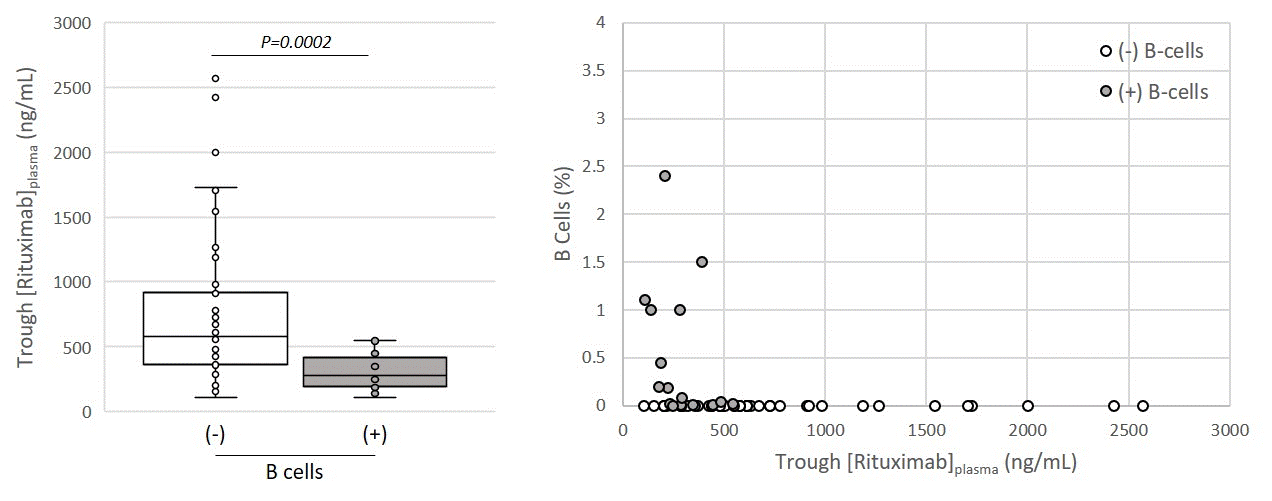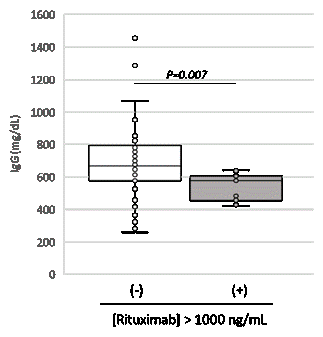Session Information
Session Type: Poster Session C
Session Time: 9:00AM-11:00AM
Background/Purpose: Rituximab (RTX), an anti-CD20 chimeric monoclonal antibody, has been shown to be an effective maintenance therapy for granulomatosis with polyangitiis (GPA) and microscopic polyangiitis (MPA). There is very little data on the development of immunogenicity in patients with GPA/MPA receiving RTX for maintenance therapy. The purpose of this study is to determine a) the rate of anti-RTX antibody development, and b) if peripheral RTX and anti-RTX levels can be predictive of B-cell depletion, ANCA negativity and hypogammaglobulinemia in GPA/MPA patients receiving RTX for maintenance therapy.
Methods: Thirty patients with a diagnosis of GPA (n=25) or MPA (n=5) were recruited from a single center. Inclusion criteria included: a) previously received RTX within the last 8 months; b) in remission and c) receiving RTX maintenance therapy. Labs including trough peripheral RTX levels and anti-RTX antibodies were checked serially just before infusions. The mean age at enrollment was 62.5 years (IQR 46.5-67.5), 70% were female, and 67% had undetectable B-cells at baseline. P-values were calculated using z-test and students t-test as appropriate.
Results: B-cell depletion was found to be more likely when the RTX trough level was greater than 500 ng/mL (93% versus 56% when trough < 500 ng/mL; p=0.002) (Figure 1). There was a non-significant trend toward a higher likelihood for both B-cell depletion and ANCA negativity by EIA when the RTX trough level was greater then 500 ng/mL (61% vs 41% when < 500 ng/mL, p=0.1354); however, the study was likely underpowered to find significance. Trough RTX levels > 1,000 ng/mL were associated with lower mean IgG levels (Figure 2).
Overall, 70% of samples had detectable anti-RTX levels. Anti-RTX levels did not correlate with B-cell depletion (p=1.0) or the combination of B-cell depletion and ANCA negativity (p=0.38). The presence of detectable anti-RTX levels were protective against the development of hypogammaglobulinemia (56% versus 83% without anti-RTX antibodies; p=0.041).
Conclusion: Some authors have supported dosing of RTX based on B-cell counts and ANCA testing, however a clear benefit of this approach has not been demonstrated. In addition, these approaches are reactionary to presumed under-dosing of RTX (i.e. either based on dose or frequency of dosing). Establishing target levels of RTX exposure offers the potential of an a priori precision dosing approach to RTX therapy in comparison to responsive monitoring of the effect of RTX. Establishing target RTX trough levels would allow for dosage determinations and adjustments based on population pharmacokinetic estimates to maximize the probability of clinical response and minimize the risk of toxicity. Based on the results of this study a RTX dosing algorithm personalized to the patient could be established. This would be a critical step towards personalized medicine in these forms of primary systemic vasculitis, and potentially other RTX treated diseases such as rheumatoid arthritis.
 Figure 1: B-cell counts based on trough rituximab levels
Figure 1: B-cell counts based on trough rituximab levels
 Figure 2: IgG based on trough rituximab levels.
Figure 2: IgG based on trough rituximab levels.
To cite this abstract in AMA style:
Springer J, Funk R. Rituximab Immunogenicity in ANCA-associated Vasculitis (RITUXIMAV) [abstract]. Arthritis Rheumatol. 2020; 72 (suppl 10). https://acrabstracts.org/abstract/rituximab-immunogenicity-in-anca-associated-vasculitis-rituximav/. Accessed .« Back to ACR Convergence 2020
ACR Meeting Abstracts - https://acrabstracts.org/abstract/rituximab-immunogenicity-in-anca-associated-vasculitis-rituximav/
